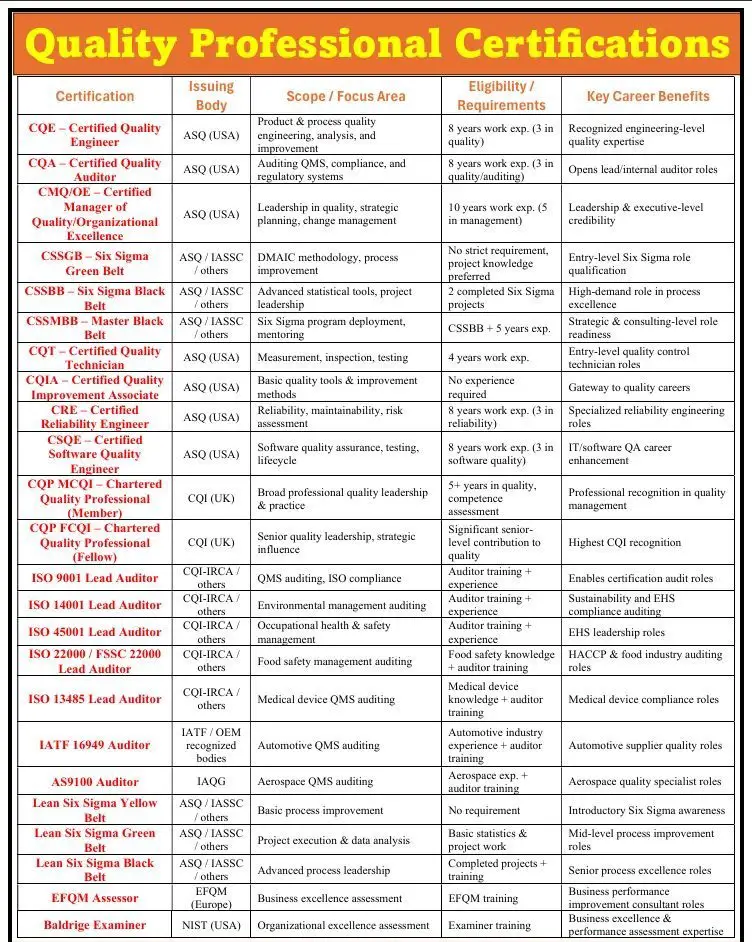In today’s competitive industrial, manufacturing, and service sectors, quality has become more than just a compliance requirement — it is a business advantage. Organizations worldwide depend on skilled quality professionals with Globally Recognized Quality Certifications to ensure processes, products, and services meet the highest standards.
One of the most effective ways for professionals to prove their expertise, gain credibility, and accelerate their careers is by earning globally recognized quality certifications. These credentials validate your skills, open leadership opportunities, and enhance your value in the job market.
This guide covers the top international quality certifications, their focus areas, eligibility requirements, and career benefits — along with a handy comparison table for quick reference.

1. ASQ (American Society for Quality) Certifications – USA
The American Society for Quality (ASQ) is one of the most respected quality organizations worldwide. Its certifications are highly valued for their depth, technical rigor, and industry applicability.
| Certification | Focus Area | Eligibility | Career Benefits |
|---|---|---|---|
| CQE – Certified Quality Engineer | Product & process quality engineering, analysis, improvement | 8 years’ exp. (3 in quality) | Engineering-level quality expertise |
| CQA – Certified Quality Auditor | Auditing QMS, compliance, regulatory systems | 8 years’ exp. (3 in auditing/quality) | Opens lead/internal auditor roles |
| CMQ/OE – Certified Manager of Quality/Organizational Excellence | Leadership in quality, strategic planning, change management | 10 years’ exp. (5 in management) | Leadership & executive credibility |
| CQIA – Certified Quality Improvement Associate | Basic quality tools, improvement methods | No experience needed | Entry-level pathway to quality careers |
| CQT – Certified Quality Technician | Measurement, inspection, testing | 4 years’ exp. | Technician-level quality recognition |
| CRE – Certified Reliability Engineer | Reliability, risk analysis, maintainability | 8 years’ exp. (3 in reliability) | Specialized reliability expertise |
| CSQE – Certified Software Quality Engineer | Software QA, testing, lifecycle | 8 years’ exp. (3 in software quality) | IT/software QA career enhancement |
| CSSGB / CSSBB / CSSMBB – Six Sigma Green Belt, Black Belt, Master Black Belt | Process improvement, DMAIC, data analytics, project leadership | Varies by level | Roles in process excellence & consulting |
2. CQI (Chartered Quality Institute) Certifications – UK
The Chartered Quality Institute (CQI), based in the UK, is a global professional body for quality, offering recognition through membership grades and certifications.
| Certification | Focus Area | Eligibility | Career Benefits |
|---|---|---|---|
| CQP MCQI – Chartered Quality Professional (Member) | Quality leadership & management | 5+ years in quality + competence assessment | Professional recognition |
| CQP FCQI – Chartered Quality Professional (Fellow) | Senior leadership, strategic influence | Significant senior-level contribution | Highest CQI recognition |
3. IRCA (International Register of Certificated Auditors) Certifications
IRCA specializes in auditor certifications for ISO-based management systems. These credentials are widely recognized in compliance, sustainability, and operational excellence roles.
| Certification | Focus Area | Eligibility | Career Benefits |
|---|---|---|---|
| ISO 9001 Lead Auditor | Quality management auditing | Auditor training + experience | Certification audit roles |
| ISO 14001 Lead Auditor | Environmental management auditing | Auditor training + experience | EHS & sustainability roles |
| ISO 45001 Lead Auditor | Occupational health & safety management | Auditor training + experience | Workplace safety auditing |
| ISO 22000 / FSSC 22000 Lead Auditor | Food safety management | Food safety knowledge + training | HACCP & food safety compliance |
| ISO 13485 Lead Auditor | Medical device quality management | Medical device knowledge + training | Medical device compliance |
4. Lean Six Sigma Certifications (ASQ, IASSC)
Lean Six Sigma is a globally recognized methodology for process improvement, combining Lean efficiency principles with Six Sigma’s data-driven problem-solving approach.
| Belt Level | Focus Area | Eligibility | Career Benefits |
|---|---|---|---|
| Yellow Belt | Basic Six Sigma concepts, team participation | No experience required | Introductory level |
| Green Belt | Project leadership, statistical analysis | Basic stats knowledge, project work | Mid-level improvement roles |
| Black Belt | Major cross-functional projects, advanced analytics | Completed Green Belt + projects | Senior process excellence roles |
| Master Black Belt | Enterprise-wide Six Sigma deployment, mentoring | Black Belt + 5 years’ exp. | Strategic leadership & consulting |
5. Industry-Specific Quality Certifications
Some industries require specialized quality certifications due to strict regulatory requirements.
| Certification | Industry Focus | Career Benefits |
|---|---|---|
| IATF 16949 Auditor | Automotive quality management systems | Automotive supplier quality roles |
| AS9100 Auditor | Aerospace QMS | Aerospace quality leadership |
| HACCP Auditor | Food safety & hazard control | Food industry compliance roles |
| NQA-1 Auditor | Nuclear quality assurance | Nuclear sector QA roles |
How to Choose the Right Certification
Selecting a quality certification should be based on:
- Your Industry – Choose certifications that align with your sector.
- Your Career Stage – Beginners can start with CQIA, Yellow Belt, or ISO 9001 Auditor; experienced professionals can target CQE, CQA, or Black Belt.
- Your Long-Term Goals – If aiming for leadership, opt for CMQ/OE, CQP FCQI, or Master Black Belt.
Tip: Combining technical certifications (CQE, CRE) with auditing certifications (ISO Lead Auditor) and leadership certifications (CMQ/OE) creates a strong professional profile with global credibility.
Conclusion
Quality certifications are more than credentials — they are career accelerators. They demonstrate your competence, commitment, and ability to deliver excellence, whether in manufacturing, IT, healthcare, food safety, or aerospace.
By earning certifications from recognized bodies such as ASQ, CQI, IRCA, or Lean Six Sigma organizations, you position yourself as a trusted expert capable of leading improvement initiatives, ensuring compliance, and driving organizational success.
The future of quality leadership belongs to those who continuously learn, certify, and apply their knowledge to real-world challenges.
